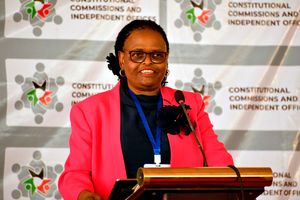Private security guards to get pay raise as their minimum salary raised to Sh30,000

Private Security Regulatory Authority Director-General Fazul Mahamed inspects a guard of honour mounted by G4S Security Group staff at The Junction Mall in Nairobi in September.
What you need to know:
- The salary increment is part of the wider reforms in the sector to also cater for guards’ welfare.
- Payslips shown to the Nation paint a picture of silent suffering by the cadre of workers.
- The new salary includes a basic pay of Sh18,994, house allowance of Sh2,850, and overtime allowance of Sh8,157.
Private security guards now have a reason to smile after the government set their minimum gross pay at Sh30,000 per month.
This comes as a major boost to at least one million guards employed by 2,000 security firms.
In a gazette notice published by the Private Security Regulator Authority (PRSA), any employer who will fail to adhere to this directive will be fined Sh2 million, be imprisoned or be subjected to both. The new salary includes a basic pay of Sh18,994, house allowance of Sh2,850, and overtime allowance of Sh8,157.
Minus statutory deductions, which include the National Social Security Fund (Sh1,080), Social Health Insurance Fund (Sh825), Pay As You Earn (Sh1,229) and affordable Housing Levy (Sh450), the minimum amount landing in the private security guards’ bank accounts every end month should be Sh26,415.
The PRSA has also issued minimum qualifications for private security guards. They should hold a valid training certificate from an accredited institution and be licensed in line with the Private Security Regulation Act.
“Any person who will fail to adhere to this commits an offence and shall be liable to a fine, or to both a fine and imprisonment, in the case of a natural person, and Sh2 million in the case of a corporate,” the gazette notice stated.
The new directive comes as good news for many private security guards whose meagre salaries, coupled with harsh working conditions, have been forced to live in abject poverty.
Copies of payslips shown to Nation paint a picture of silent suffering by this cadre of workers.
One security guard employed by SGA Security in Nairobi receives a net salary of less than Sh1,500. This is after deductions amounting to over Sh16,000 from his gross salary of Sh18,000.
Another guard in the same company, takes home Sh16,678 because he doesn’t have any deductions other than the statutory ones. Both of these guards, according to the reviews made by the PSRA, are greatly underpaid and require a 66.7 per cent pay rise to reach the Sh30,000 minimum salary.
Another security guard, who opted to keep his employer’s identity hidden, shared his payslip showing his gross earning of Sh20,370.
This figure plummets to a net pay of Sh7,300 when one factors in the statutory and other personal obligatory deductions.
Payslips from some mid-level management employees of several firms including KK and Securex Agencies currently earn a gross salary above Sh30,000. One such employee at KK earns Sh30,400.
At Securex Agencies, a guard’s payslip showed he earns a gross pay of over Sh37,000 but has deductions of over Sh16,000 and a take-home salary of Sh21,000.
The private security industry generates Sh100 billion annually and employs over one million people.
The government is in the process of integrating the industry into the national security infrastructure to enhance intelligence gathering, information sharing, crime detection and deterrence, crime scene protection and collection and preservation of evidence in the war on terrorism.
Early this year, Interior Principal Secretary Raymond Omollo launched an initiative to standardise the training curriculum for all security firms.
He said the move will not only promote professionalism in the industry. The reforms will eventually see private guards take over some government installations.





